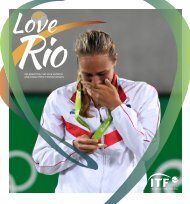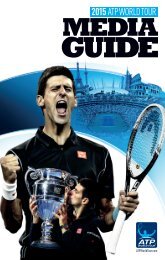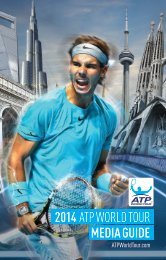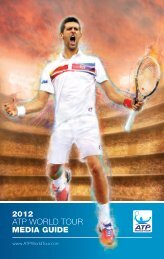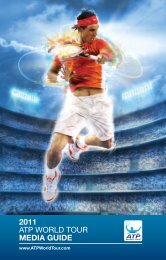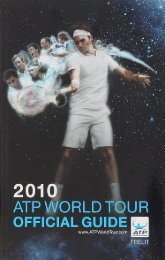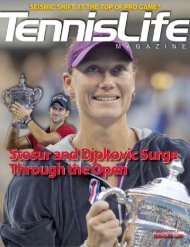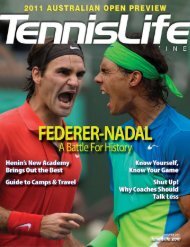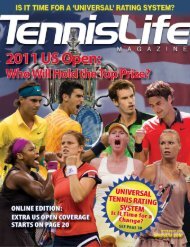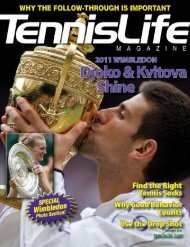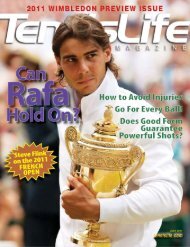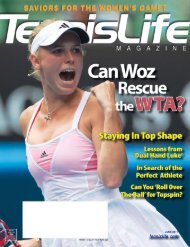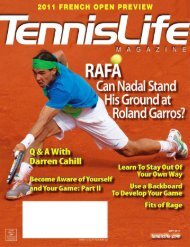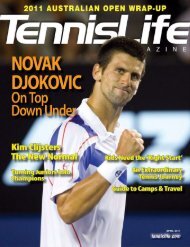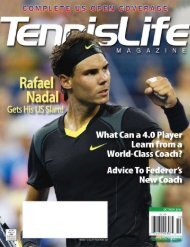A Champion's Mind - Pete Sampras
www.tennismoscow.me Insta:TENNISMOSCOW
www.tennismoscow.me Insta:TENNISMOSCOW
Create successful ePaper yourself
Turn your PDF publications into a flip-book with our unique Google optimized e-Paper software.
played many matches like this before on grass. The trick was to stay alert, focused, and confident, because<br />
my chance would come. I was getting to him, I felt pretty sure about that. It was just a matter of time.<br />
But before we could finish the set, the rains came. We had a break of a few hours, and that gave both of<br />
us a little time to think and regroup. When we returned to the court, he was a different player. He was<br />
suddenly going for his shots, especially his second serve. Whether he knew it or not, he was taking me<br />
into the territory I least liked to visit. My m.o. called for me to approach even the most lethal serve-andvolleyers<br />
with the expectation that I’ll get a good look at some second serves. If that happened, I could<br />
beat them. The strategy worked against Goran Ivanisevic, it worked against Boris Becker, and it worked<br />
against Stefan Edberg. But when it became harder for me to get a sniff at a second serve, it created a chain<br />
reaction. If I couldn’t get to his serve, that put more pressure on mine. I think Richard sensed that, and his<br />
own excellent serving freed up the rest of his game, especially his return game. And that’s how it almost<br />
always works.<br />
Krajicek won the first set 7–5, breaking me once. It emboldened him, and suddenly he was getting hold<br />
of my serves with his backhand return. Plus, his passing shots were impeccable. I lost the second set 6–4,<br />
and was relieved when it started to sprinkle again, because the light was fading. I knew we would never<br />
finish the match that day, and I really needed to regroup.<br />
Yet instead of thinking, Tomorrow’s a new day, I’ll get back on track—no way he can stay hot like<br />
that . . . I had a strange sense of foreboding. I didn’t feel good about the way the match was going, and<br />
knew I was in a big, big hole. Paul worked double time that night to get me back up, to restore my<br />
confidence, but he couldn’t pull me out of it. Although I was still in the match, I was feeling negative.<br />
When we returned to play the next day, we just continued where we left off. Richard came out bombing<br />
away, and I immediately got discouraged, thinking, Hey, this is what I do to people on grass. Long story<br />
short, he closed me out. All the credit to Richard for getting the job done. He played a great match,<br />
technically and mentally. And it was some balm for me to see him go on to win the tournament—if you’re<br />
going to lose, you may as well lose to the guy who’s going to run the table. I’ve never watched that match<br />
on tape, but I’d be curious—just to see if Richard’s game really did change as much as I believe it did<br />
after the rain delay.<br />
At the end of that day, three of the majors were gone, and I had yet to win one. Although I wasn’t<br />
exactly thinking I had to win a Slam for Tim, others frequently brought up the subject. To me, though, that<br />
wasn’t the point. It was simple: win or lose, the French Open had been “our” major—the Tim major. I fell<br />
short of honoring Tim with a win, so the movie didn’t end the way everyone expected. But that didn’t<br />
change the magical moments or emotions I experienced at Roland Garros, and it didn’t change the way I<br />
felt about Tim or the right way to honor his memory. When I won my next major, I could make a pretty<br />
speech about “winning one for Tim.” It was what everyone wanted to hear. But I wasn’t going to do that; it<br />
would have been phony. And I kept that promise to myself.<br />
The summer hard-court season leading up to the U.S. Open was always low-key. As hectic as the Open<br />
is, the tournaments leading up to it are laid-back affairs of the heartland. Indianapolis and Cincinnati are<br />
two of the biggest events, yet you can drive from one venue to the other in an afternoon, and each one has<br />
a little bit of that air of a county fair. Some of us players had a running joke when we got to Indy or Cincy.<br />
We’d just look at each other, shrug, and say, “Same shit, different year.”<br />
Although I lost in the quarterfinals at Cincinnati to Thomas Enqvist, I won Indianapolis, improving my<br />
career record against Goran to 8–6. Going into New York, I felt good about extending my streak of<br />
winning at least one major per year to four. And the draw opened up nicely for me. The only name player<br />
I would meet before the quarterfinals was Mark Philippoussis, whom I handled in straight sets. That put<br />
me into the quarterfinals against Alex Corretja, who was known primarily as a clay-court grinder, but



